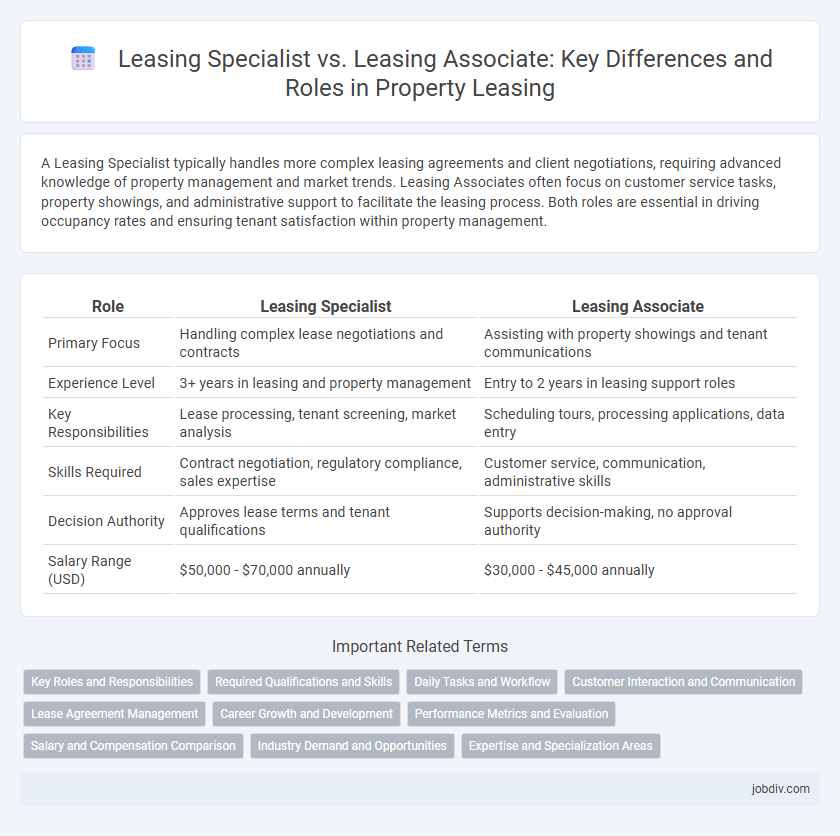A Leasing Specialist typically handles more complex leasing agreements and client negotiations, requiring advanced knowledge of property management and market trends. Leasing Associates often focus on customer service tasks, property showings, and administrative support to facilitate the leasing process. Both roles are essential in driving occupancy rates and ensuring tenant satisfaction within property management.
Table of Comparison
| Role | Leasing Specialist | Leasing Associate |
|---|---|---|
| Primary Focus | Handling complex lease negotiations and contracts | Assisting with property showings and tenant communications |
| Experience Level | 3+ years in leasing and property management | Entry to 2 years in leasing support roles |
| Key Responsibilities | Lease processing, tenant screening, market analysis | Scheduling tours, processing applications, data entry |
| Skills Required | Contract negotiation, regulatory compliance, sales expertise | Customer service, communication, administrative skills |
| Decision Authority | Approves lease terms and tenant qualifications | Supports decision-making, no approval authority |
| Salary Range (USD) | $50,000 - $70,000 annually | $30,000 - $45,000 annually |
Key Roles and Responsibilities
Leasing Specialists manage tenant relations, coordinate lease agreements, and ensure compliance with property regulations, often handling more complex leasing transactions. Leasing Associates typically support the leasing process by assisting with property tours, processing applications, and maintaining leasing documentation. Both roles require strong communication and customer service skills but differ in responsibility scope and decision-making authority.
Required Qualifications and Skills
Leasing Specialists typically require advanced knowledge of property management software, strong negotiation skills, and expertise in lease agreements to handle complex leasing transactions. Leasing Associates often need foundational skills in customer service, basic understanding of leasing processes, and proficiency in maintaining leasing documentation. Both roles demand excellent communication skills, attention to detail, and the ability to work effectively with prospective tenants and property owners.
Daily Tasks and Workflow
A Leasing Specialist primarily handles in-depth client consultations, lease negotiations, and ensures compliance with regulatory standards, managing complex lease agreements and renewals. Leasing Associates focus on daily operational tasks such as property tours, tenant inquiries, application processing, and initial lease documentation. Both roles collaborate closely, but the Specialist oversees advanced lease management while the Associate supports tenant interactions and administrative duties.
Customer Interaction and Communication
Leasing Specialists typically manage more complex customer interactions, utilizing advanced communication skills to negotiate lease terms and resolve conflicts effectively. Leasing Associates often handle initial customer inquiries and provide basic information, focusing on building rapport and ensuring a positive first impression. Both roles require strong interpersonal skills, but Leasing Specialists engage in deeper, solution-oriented conversations to secure lease agreements.
Lease Agreement Management
A Leasing Specialist possesses advanced expertise in lease agreement management, including drafting, negotiating, and ensuring compliance with legal standards, which directly enhances tenant satisfaction and reduces risk. Leasing Associates support these processes by maintaining accurate lease records, assisting with documentation, and facilitating communication between landlords and tenants. The differentiation lies in the specialist's strategic oversight of complex lease terms versus the associate's operational role in lease administration.
Career Growth and Development
Leasing Specialists typically handle more complex leasing negotiations and client interactions, positioning them for accelerated career growth in real estate management and sales leadership roles. Leasing Associates often focus on entry-level tasks such as showing properties and processing applications, serving as a foundational stepping stone for developing essential leasing skills. Progression from Leasing Associate to Leasing Specialist enables enhanced expertise, higher earning potential, and opportunities for advancement into property management or commercial leasing positions.
Performance Metrics and Evaluation
Leasing Specialists are primarily evaluated based on lease conversion rates, tenant retention, and upsell success, reflecting their direct impact on revenue generation and client satisfaction. Leasing Associates' performance metrics emphasize lead generation, inquiry response time, and administrative accuracy to support seamless leasing operations. Both roles rely on key indicators like occupancy rates and customer feedback scores but differ in focus, with Specialists targeting strategic leasing outcomes and Associates ensuring operational effectiveness.
Salary and Compensation Comparison
Leasing Specialists typically earn higher salaries than Leasing Associates due to their advanced responsibilities and expertise in tenant relations, property marketing, and lease negotiations. On average, Leasing Specialists receive compensation packages ranging from $45,000 to $60,000 annually, while Leasing Associates' salaries generally fall between $35,000 and $45,000. Performance bonuses and commission structures tend to be more lucrative for Leasing Specialists, reflecting their critical role in securing tenants and optimizing occupancy rates.
Industry Demand and Opportunities
Leasing Specialists are in high demand due to their advanced expertise in property management and tenant relations, often leading to greater opportunities for career advancement and higher salaries within commercial and residential leasing sectors. Leasing Associates typically serve entry-level roles with foundational responsibilities, providing a crucial stepping stone in the industry but with more limited growth potential compared to Specialists. The leasing industry values Specialists for their ability to drive revenue growth and manage complex lease agreements, making them essential assets amid increasing market competition.
Expertise and Specialization Areas
Leasing Specialists possess in-depth expertise in market analysis, contract negotiation, and portfolio management, enabling them to optimize leasing strategies for diverse property types. Leasing Associates focus primarily on tenant relations, property showings, and administrative support, ensuring smooth day-to-day leasing operations. The specialization of Leasing Specialists in financial assessment and legal compliance differentiates their role from the client-facing and operational tasks managed by Leasing Associates.
Leasing Specialist vs Leasing Associate Infographic

 jobdiv.com
jobdiv.com